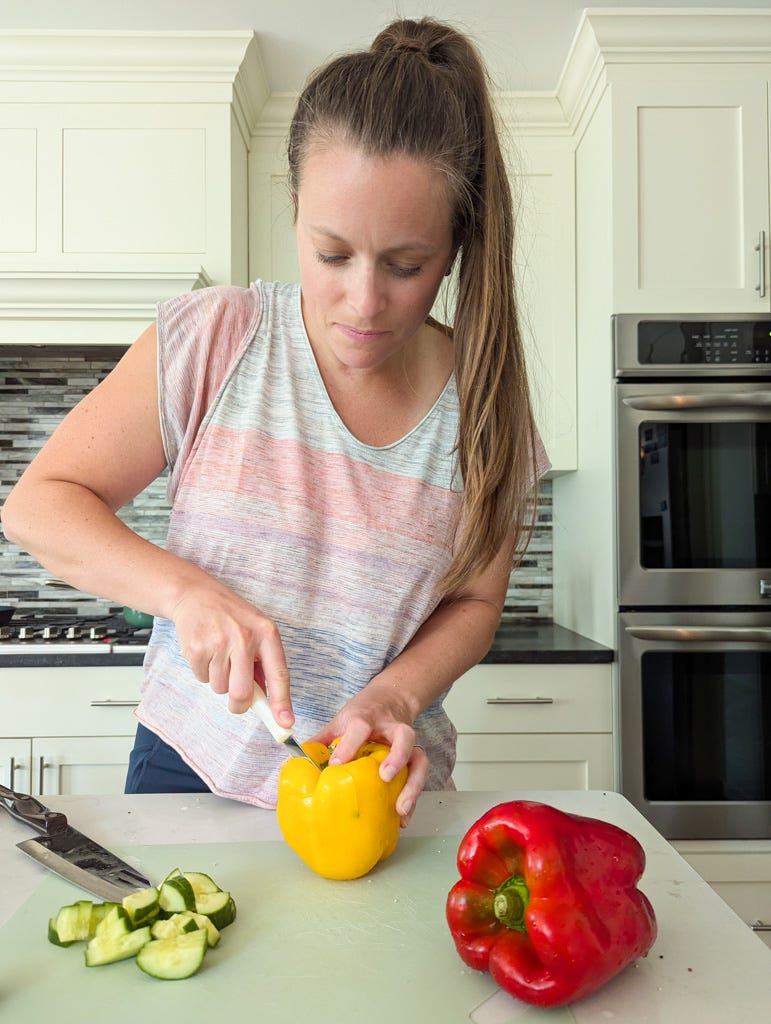This is a long one, but bear with me. 🥰
I've been an “eco mom” since circa 2015, after a clothing challenge changed my consumption habits in my closet and, eventually, my life. I’m the weirdo who loves to compost, doesn’t shop at Amazon, uses reusable dishware at parties, makes graphs about washing and reusing my Ziploc bags (peak nerd stuff, friends 🤓), and is impossible to buy gifts for because I don’t need any more stuff1.
You know the type. 💁🏼♀️ I also write about it online.
In some ways, the MAHA (Make America Healthy Again) moms of 2025 are the eco moms of 2015, but with a dark twist. We (supposedly) want many of the same things: cleaner environments, fewer toxins, less pollution, and healthier humans! I said this back in November, but the Washington Post is making similar arguments, so I thought it was worth revisiting.
Moreover, some MAHA moms were eco moms who had a change of heart (and I have some theories about why). Hint: it’s always about money.
first, a clarification
Some in the MAHA movement promote their ideas solely for profit or because they’re cavalier jerks. 👀 RFK Jr… we’re looking at you on both accounts. I hope you rot in hell. 🔥 There’s also a profit-hungry political structure coalesced around the MAHA garbage. Eco moms of 2015 didn’t have that, so there is a clear difference concerning the power of the movement.
However, I believe many moms slipping into the MAHA sway have the best intentions. When I refer to the MAHA moms of 2025, I’m focused on the everyday moms under the spell that they’re fighting the good fight (while our administration uses their collective power to install authoritarians and dismantle public health systems in our country).
individual action first
Like the OG2 online eco moms, MAHA moms promote primarily individual action to achieve their goals and protect their families. They tend to focus on changes families can make around food and lifestyle choices in their homes because 1) those are the things they can most easily control, and 2) their privilege protects them from the harshest of our public health failures.
Like the eco moms of 2015, the MAHA moms of 2025 aren’t focused on the Big Policy issues that drive sustainable and systematic environmental or public health progress. To the extent they consider policy matters, they focus on "easy wins," like removing food dyes from our food. However, food dyes are far from the most significant harm to public health. It’s not that different from advocating for bans on plastic straws to save the planet. It's helpful, I suppose, but not moving the needle much.
Real health issues due to inequity or corporate influence, like food insecurity, pollution, soil and water contamination, and poor eating habits, are challenging problems to solve and require sacrifice from the privileged. We may have to pay more taxes or stop shoving harmful externalities from conspicuous consumption into underserved neighbors. Believing that a handful of individual changes will fix everything is much more comfortable.
we've already been down this road
Over the last decade, eco moms have tried individual action and realized it doesn't work. It's too taxing, available only (and barely) to the most privileged, does nothing to help the larger population, and is not sustainable even at the individual level. Eventually, it leads to burnout and exhaustion (and that tax is mainly on women).
Moreover, many changes can't be made at the individual level because the damage happens upstream. You can't have clean water flowing from your sinks if it's polluted with PFAS. You can't have clean air in your yard and home if coal plants spew toxins everywhere. You can't have clean soil in your garden if everything is doused in glyphosate. Chemical runoff spreads whether or not your farmer uses them.
After a decade (or more) of eco-friendly lifestyle advocacy, eco moms leaned into systematic shifts and policy advocacy. We know that even the most diligent individuals can't evade a broken and corrupt system.
Fixing the system requires collective action, government policy, scientific evidence, and enforcement agencies with enough power and expertise to confront the multinational corporations and billionaires perpetuating and funding environmental and toxic damage.
MAHA moms are walking that same path a decade later, believing individual action is the solution. Logic might suggest they’d learn from eco moms’ experiences and know that making America healthy requires more than purchasing the right sh*t with the best affiliate codes.
Instead, MAHA moms wandered in the opposite direction to double down on pricey, privileged solutions, aggressively dismantle public health institutions, and delegitimize established science and evidence-based research.
why the divergence?
Despite eco moms and MAHA moms having similar priorities on the surface, I think two significant forces are causing them to diverge in their tactics and motivations: COVID and shifting social media incentives.
First, COVID created an intense period of uncertainty and exhaustion. A global pandemic with unknown causes and treatments, intense and rapid shifts in our lives, and immense pressure on moms to pick up the slack when schools and caregiving centers closed left many moms exhausted.
It also opened a window for government skepticism when even our most prestigious health institutions didn't have answers. This left a plethora of moms desperate and ripe for something—anything—to calm the stress and anxiety.
Then, the wellness grifters had “solutions” and social media set them loose! 💃🏼 "We've got a salve for that," they said. Social media and its fear-loving algorithms swooped in and provided a direct line of communication for the wellness hotties to come in hot with all the answers. MLMs to the rescue for vulnerable moms... again! 🫶🏼
from blogs and timelines to algorithms and affiliate links
To understand the media ecosystem shifts that drive different behavior from moms (and creators generally) with many of the supposedly same high-level stated goals, let’s take a walk down memory lane and examine how the influencer economy used to operate and how it operates now.
back in the day of 2015 eco moms
In 2015, blogs and basic social media drove conversation among eco moms. We bookmarked a handful of favorite websites to visit each morning, and our personal preferences (more than algorithms) drove what we saw on socials.
Blogs earned most income from programmatic ads, some sponsorships, and web-based affiliate links. The ads didn't care much about the nature of the content (within reason). If you wrote good stuff that people enjoyed reading, the ads paid. The influencer industry was more nascent and far less greedy.
Social media success blossomed from pretty filters, aesthetic appeal, and aspirational content. It looked like high follower counts and many likes, but didn’t translate directly to compensation.
There were not many links on social media (at least not on Instagram, where the eco moms and MAHA moms thrive). Only those with large followings had access to links that led users off the platform, and there were very few affiliate links. Social promotion wasn't that mature yet.
Eco moms struggled to get paid for their work. Programmatic ad networks have high page view thresholds, and most eco mom blogs didn’t qualify. Sustainable brands have small marketing budgets, so sponsorships were limited. And, spoiler alert, it's hard to make bank on sponsorships and affiliate links when the whole vibe of your content encourages followers to consume less sh*t (so they still struggle to make a living).
now affiliate links abound, and outrage drives audience
For the 2025 MAHA moms, blogs are dying, and social media “success” derives from outrage and fear-based content. This type of content increases engagement, the ultimate measure of success for the algorithms, and provides more followers to maximize the conversion value of affiliate links. Instagram feels like one giant affiliate link. 🙄
Unless you're a creator, you probably don't know what's happening on the backend of some of this content, so let’s dig in for a minute.
When you see someone encourage a comment using a specific word, they're likely using a bot program like ManyChat that automates responses, engagement, and link sharing in DMs.
In the screenshot below, you can see how I use it on my account. In the caption, I tell people to “Comment JOIN” for a link for more details. That “Message sent ✅ It’s in your DMs.” is a bot response. I didn’t type that or send the link they got in their DMs either. I use it for articles sometimes, but it’s often used to send followers affiliate links. 👉🏼 You purchase, and I make a nice commission on that sale without opening my Instagram app.
Instagram wants to keep users on the platform. Heaven forbid you fall down a rabbit hole on a browser instead of in their app. Companies like ManyChat exist precisely to convert links (especially affiliate links) while enhancing engagement, which is a win for Instagram, ManyChat, and the creator.3
Affiliate links aren't inherently bad when used responsibly and for products an influencer enjoys. But they're tempting as hell to use with abandon, even if you're not absolutely in love with the product or service being promoted! Trust me. I've been hanging out in the influencer space since 2013.
Affiliate links provide legit income. One year, I made over $20,000 from links for one product alone (and I don't even have a large audience). Another friend with a small audience made over $10,000 in the month leading up to Christmas from one toy she recommended.
Ex-influencers like Jess Kirby, writer of
, know how tantalizing affiliate income can be when you're willing to promote whatever pays the most. She answered questions about what happens behind the influencer curtain, and specifically addressed the allure of influencing not long ago.Affiliate revenue ranges from a few percent to 40-50% of the sale price. You can make serious money selling expensive products like wellness supplements, cleanses, and holistic services!
Multi-level marketing companies make hawking products online even more lucrative if you can amass a decent audience that trusts you. MLM participants make upwards of a 50% profit on sales. They typically pay a wholesale price to the MLM company and then sell at retail to customers.
so what’s my point?
Earning an income from selling sh*t on social media is a far more mature and fluid process than it was a decade ago and can be wildly profitable. The pull to monetize one's audience is incredibly strong, and brands pay handsome sums for borrowing an influencer's parasocial bestie audience.
Furthermore, brands have realized that nano-influencers, those with smaller followings, garner more trust from their audience and convert sales at a higher rate. The push to monetize social media audiences is moving downmarket. Consequently, shifts to promote pricey wellness products with affiliate income opportunities are incredibly attractive and readily available to influencers with audiences large and small.
creators want to get paid for their work; MAHA is willing to pay them
As I noted above, eco moms and MAHA moms have a lot of ideological overlap. On the surface, they want healthier air, water, and soil. They support sustainable food systems. They oppose toxic chemicals like PFAS inundating our ecosystems. So why are they diverging on politics so drastically? Wildly different incentives drive them apart.4
Ten years ago, eco moms didn’t have the tools or profit opportunities that MAHA moms have today. Those profit motives are strong and heavily influence the behavior of influencers.
Outrage and fear-mongering didn't drive engagement a decade ago (like it does now), and affiliate/MLM opportunities weren't nearly as lucrative and wildly available in the eco-friendly living social media space as they are now in wellness channels. Eco moms wanted to get paid, but there were fewer opportunities to convert messaging into money.
Today, the MAHA movement has strong financial incentives to create fear and anger, feed the algorithm its desired dessert, and gain an audience as a reward for fostering its prized engagement. Then, they sell shoddy or untested products 1) as solutions to the problems they create or 2) as perceived solutions to issues that can only be solved meaningfully by systemic change and government oversight.
Many MAHA moms are fed misinformation from wellness influencers who financially benefit from convincing vulnerable mothers that government oversight is a lost cause, individual action is the quick fix, and the influencers' recommendations are the magic potion to make everything better.
Wellness influencers make serious money off affiliate revenue and sales of their untested, unapproved products. It's a profitable grift!
Moreover, MAHA moms can make money as affiliates (on flexible work-from-home schedules) when they hawk the grifty wellness products they bought for themselves. Bigger wellness influencers make even more money when these MAHA mom followers, who've developed parasocial friendships with the influencers, sign up as down-line salespeople in wellness product MLM chains.
Many MAHA mom influencers make legitimate affiliate or MLM income from the wellness products they promote. Those who were eco mom influencers acutely know how little money came from all the free labor given to produce content in the past.
conservatives are paying big money for politically coded lifestyle content
And all this is... 🥁 drum roll please... Exactly why we need to pay the influencers and information mavens (i.e. the messengers and marketers) sharing good sh*t on social media. They want and deserve to get fairly compensated for their work. When they don't, they may turn to dubious sources of engagement and grifty affiliate opportunities.
📣 Yoo hoo. To democracy, climate action, and public health advocates who have money - are you listening??! Democrats - this message is for you.
If you want eco moms to stick around and not morph into MAHA moms voting for wildly corrupt leaders5, worm brains, and drunk secretaries, pay your messengers. They'd be thrilled with just a fraction of the dough you're doling out to expensive Washington consultants.
Do you know how much good data you could get from DMs and comment sections?! It's like a focus group on steroids. Followers share far more personal information with their parasocial friends through social media relationships. Strategy groups could have all of this information for a pittance of the billions raised in fundraising dollars. Mom influencers want to make a living, not become billionaires.
Conservative groups have capitalized on the opportunities to use savvy social media strategies (and conventionally pretty women) to scoop up new blood. They invest in the platforms, pay the creators, and support growth and engagement.
has discussed this many times and advocated for far greater investment in influencers from Democratic donors and groups.If we want to see this country move back toward more liberal, democratic norms and structures, we need to invest in the people telling the stories about how that happens, why it's essential, and how it helps people in their everyday lives.
Exhausted moms are following the money as creators. While it may drive you mad, you can understand, right? Every one of us can twist ourselves into skinny Philly-style pretzels (the best pretzels, by a long shot! 😉) and do Olympic-level mental gymnastics to make sense of whatever helps us fit in to the "in group," protects our families, pays our bills, or reduces the immediate discomfort of our lives.
MAHA gaslighting galore
The MAHA moms aren’t doing their psychological stretches and mental gymnastics without assistance. The cavalier and arrogant AF MAHA leader is a trust fund baboon who has been bamboozling, gaslighting, and abusing women practically since birth. It’s a family tradition, after all.
If you don't believe me that RFK Jr. is the scum of the Earth to women, read this book, Ask Not: The Kennedys and the Women They Destroyed, and tell me I'm wrong.
Now, he’s one-upping his family legacy and exploiting women at scale through MAHA manipulation. I'm angry at him, and I'm angry for the MAHA moms with the best of intentions being inundated by misinformation and junk "science.”
Our government agencies aren't perfect. There's corruption, fraud, and abuse within them. Corporate corruption has escalated as wealth has consolidated at the top of the food chain. Citizens United has essentially legalized corporate bribery of our elected officials. However, corruption in the private sector is far worse than government corruption. The government has systems and controls to prevent corruption, particularly among civil servants, that don’t even exist in the private sector.
Most everyday civil servants, like scientists, medical professionals, and environmental advocates who have worked for the government for decades, have the best intentions, just like the MAHA moms. We all should be on the same team. But as usual, those in power know the best way to consolidate more power is to distract the masses with chaos and confrontation amongst themselves.
Here’s the thing: The wellness industry benefits handsomely from dismantling the public health institutions whose evidence-based research tells us many wellness products don’t work. The industry is full of scammy companies promoting pseudoscience and making exaggerated and misleading claims about their products.
The wellness industry's profits will soar when the agencies that enforce product safety violations and fair marketing practices collapse. The grift is good, but there’s lots of room for improvement. The snake oil salesmen will Make Grifting Great Again when the government agencies that vet products and enforce against misleading marketing disappear (or are taken over by the grifters themselves).
MAHA makes no sense
Public health cannot exist, especially in a capitalist society, without guardrails from good government (i.e., rules and agencies to enforce those rules). The current administration is bulldozing the guardrails by dismantling the agencies that make and enforce the rules.
Good luck holding "corrupt corporations" and "Big Industry" accountable... to what? Do we think they will police themselves better than government civil servants and scientists would police them? Give me a break…
We'll never improve public health when we:
deprioritize funding for healthy school lunch programs,
reverse regulation to limit PFAS in our soil and water,
reinvest in coal power plants,
defund nutrition science (or all science for that matter),
rollback regulations on pollutants and toxic chemicals, and
lie about oh ... anything that serves the narrative.
The list could go. Follow Dr. Jessica Knurick on Substack and Instagram because her coverage of the hypocrisy and distraction from effective solutions within the MAHA movement is stellar.
how is zero oversight less corrupt than some oversight?
I'm not the first to say this, and I definitely won't be the last. Why do MAHA advocates believe zero oversight fosters less corruption than some oversight? Follow the money!
MAHA criticizes government agencies, saddled with oversight and ethics policies (even if they aren’t perfectly followed), for capitulating to profit-driven corruption at the hands of Big Pharma and Big Ag. Yet somehow, the solution is to lean into the for-profit(!!) wellness industry, which is filled with untested products and laden with affiliate codes and multi-level marketing companies? Do we think the for-profit wellness industry isn’t capitulating to profit-driven corruption?!
How is the for-profit wellness industry, with no oversight, more trustworthy and less likely to prioritize profit over people than government agencies without explicit profit motives and lots of oversight? It makes no logical sense, and this video from a dietitian pretty much sums it up:
but MAHA pays
Even though MAHA makes no sense, the money keeps rolling in. The grift is legit. Most MAHA moms have the best intentions at the outset, but I know from experience that the magnetic draw to get paid for your work is powerful.
Promoting products and watching cash flow into your bank account is enticing. Furthermore, vulnerable or desperate moms might be willing to try a variety of questionable alternatives when they feel they've run out of options or an influencer has convinced them some potion is a miracle cure.
The MAHA racket is ruining our hopes for public health policy that serves the public at large. It's distracting from real solutions. It's promoting eugenics. It's creating massive distrust in basic science. It's f*cking bringing back measles?!
The MAHA movement is succeeding because people make big money to spread its bullsh*t messages. Not to mention, it’s also empowering authoritarian leaders because the immediacy of its financial incentives proves tantalizing enough to overlook the harmful consequences of putting people in power who destroy democratic norms and values.
start paying the honest influencers who promote real solutions
We must pay the people doing real work and sharing factual information and relevant stories that shape our culture. Politics follows culture, so what shows up on social media matters in our neighborhoods, churches, community organizations, and schools.
Long-term investment in high-quality creators is essential. Social media's influence on our culture is real. The influence is present online but seeps into PTO meetings, birthday party chatter, fitness class friendships, school policies, and voting booths.
If organizations with liberal, democratic objectives won't pay creators, it's clear the right-wing media will. Not everyone will be drawn to the capitalist temptations that we're brainwashed from birth to believe define our worth. But plenty will; they already have.
They'll bend toward promoting shady affiliate-aligned, untested wellness products to get paid. They’ll trash the oversight and enforcement agencies that hold them accountable for making accurate claims about the products and their efficacy, and ultimately hamper profits.
We have a funny way of valuing unpaid labor in our culture (i.e., we don’t 🙄). If you want liberal, democratic influencers, pay them to give them the freedom to create consistently and invest in their platforms. Pay them to free up their time for more and better content.
Pay them so they can convince their IRL friends and family that they have a “real job” and it’s worth the time they commit to it. Until creative work earns a living wage, most people consider it a “cute hobby” (especially for moms).
The Democratic party raised over $1 billion, with a B, in fundraising for the Harris/Walz campaign last year. That doesn't include all the money raised for other federal, state, and local elections. There's money to invest in good messengers!
We need good stories to draw people in, help them understand the possibilities for a brighter future, and teach them how they can help make it happen. Crafting and sharing those stories takes time, skill, and dedication. Pay the creators promoting the benefits of a liberal democracy, or someone else will pay them to defeat it.
Sage Neighbor is an independent entity. I rely on reader support and subscriptions. If you enjoyed this article, please consider becoming a paid subscriber or sharing with friends.
You may also enjoy these articles:
My husband can tell you all about this.
I know the environmental movement goes back decades and is really deeply connected to Indigenous culture and wisdom. O.G. just refers to the mom-influencer online version of this movement.
It’s not usually a win for the planet or your bank account. As we see with the MAHA movement, the successful and scalable promotion of products for affiliate income benefits also requires breaking down the public health institutions whose evidence-based research tells us those wellness products don’t do much. Also, not great.
I’m not suggesting this is the only reason, but it’s one significant reason the pursuit of similar agendas compete with each other.
Accepting $400 million airplanes as foreign gifts in broad daylight and bragging about it, for goodness’ sake! What do we expect from citizens when the people running the place are OG grifters across the board (Trump, RFK Jr, Dr Oz… the list goes on)?












